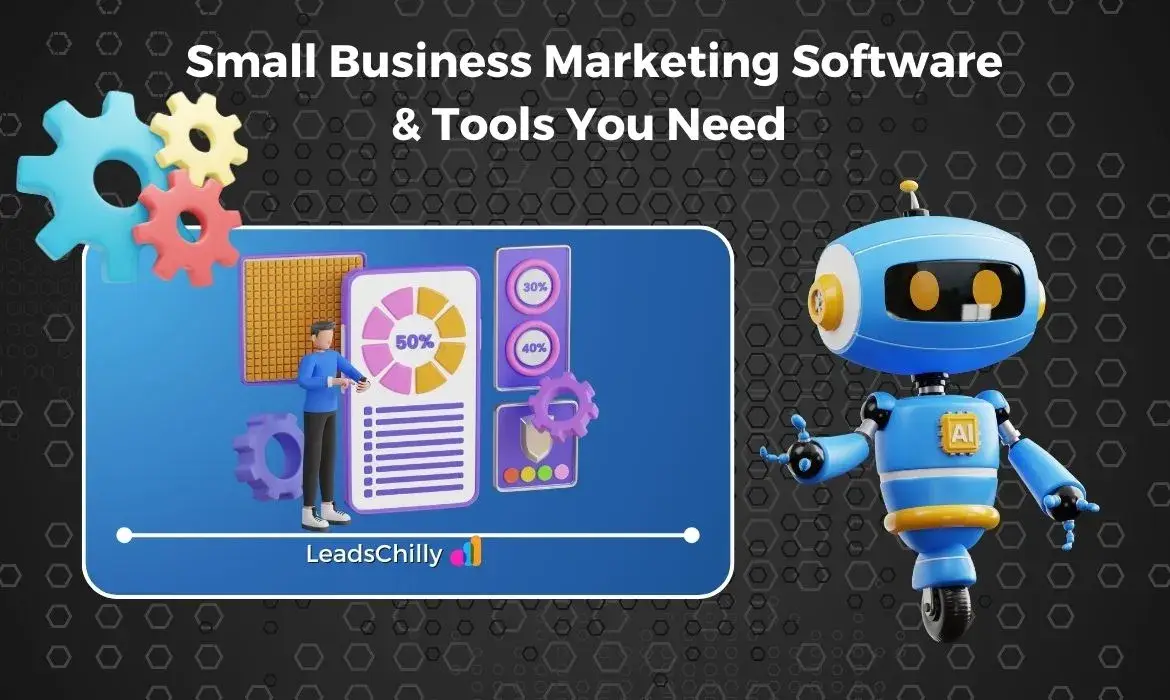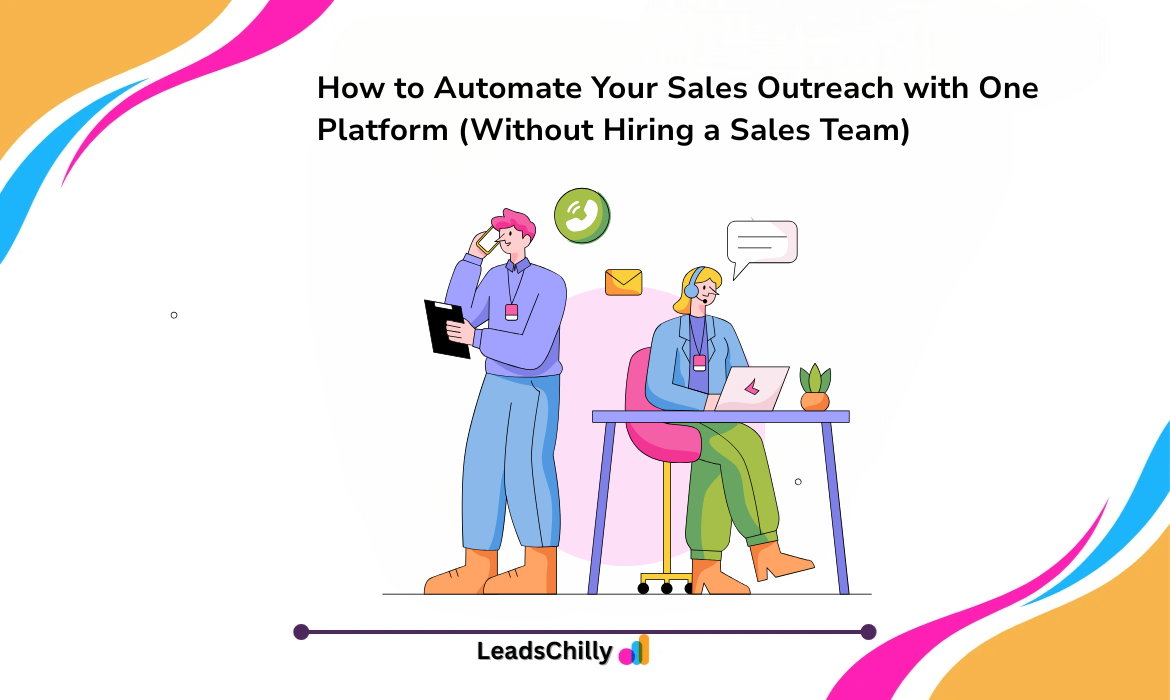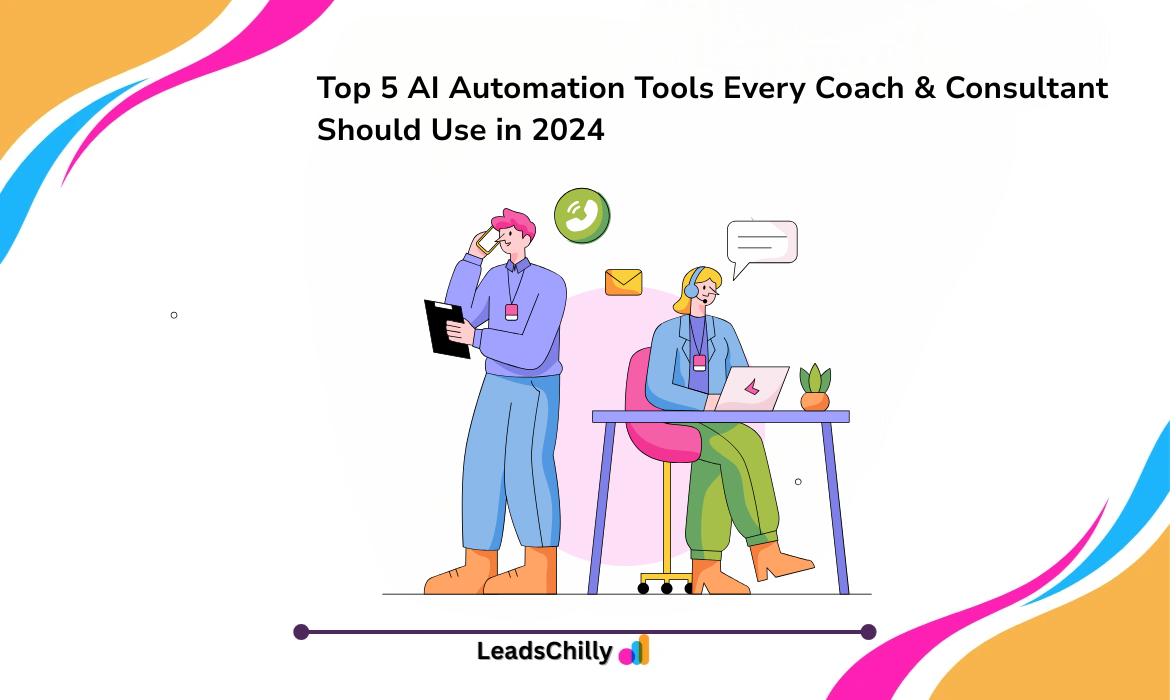Modern business environments require SMBs to maintain high levels of marketing software to remain relevant. By leveraging the right resources, one is in a position to be more efficient and effective at marketing, spread the word, and increase profitability. This comprehensive guide will help you navigate the world of small business marketing software or those who want to improve their current approach.
The global social media management software market is expected to reach $1.31 billion by 2024 at a CAGR of 18% (MarketWatch, 2021). It shows that this channel remains strong and will continue to benefit from technological advances in the marketing industry.
Try LeadsChilly a top-rated marketing solutions with a 14-day free trial! Start today, or login to your account to explore more features.
How Can Small Businesses Leverage Digital Marketing Software?
Digital marketing is crucial for small businesses seeking to expand their reach and enhance their online presence. By utilizing digital marketing software, small businesses can achieve the following:
1. Target Specific Audiences
Digital marketing tools enable you to precisely target your ideal customer demographics. This ensures your marketing efforts are seen by those most likely to engage and convert.
2. Automate Marketing Campaigns
Many digital marketing platforms offer automation features, allowing you to save time and maintain consistent messaging across various channels without manual effort.
3. Track Performance Metrics
Monitoring the effectiveness of your campaigns is vital. Digital marketing tools provide detailed analytics, enabling you to assess performance and refine your strategies for better results.
Ready to boost your business? LeadsChilly.com offers cutting-edge marketing solutions designed for small businesses. Sign-up and enjoy 14-day free trial!
Which Marketing Tool is Best for Small Businesses?
Choosing the right marketing tool depends on your business’s specific needs. Here are some of the best small business marketing software or tools for small businesses:
1. Email Marketing Software
- Mailchimp: Ideal for small businesses due to its ease of use and robust features, including automation and segmentation.
- Constant Contact: Offers customizable templates, a user-friendly interface, and excellent customer support.
2. Social Media Management Tools
- Hootsuite: Manage multiple social media accounts, schedule posts, and track engagement in one place.
- Buffer: A simple tool for scheduling posts across social platforms, providing analytics to improve your strategy.
3. SEO Tools
- SEMrush: Comprehensive tool for keyword research, competitor analysis, and SEO audits.
- Yoast SEO: A WordPress plugin that helps optimize your content for search engines, ensuring your website ranks higher in search results.
Need help choosing the right tool? Contact LeadsChilly.com for personalized recommendations tailored to your business needs!
How Can You Market Your Own Business?
Marketing your business on your own might seem daunting, but with the right strategies and small business marketing resources, it’s entirely possible:
- Develop a Strong Online Presence: Create a professional website and optimize it for search engines using SEO techniques. Utilize social media platforms to connect with your audience.
- Content Marketing: Share valuable content through blogs, videos, and infographics that address the needs and interests of your target market.
- Leverage Email Marketing: Build a mailing list and regularly send newsletters or promotions to keep your audience engaged.
What is a Marketing Strategy for Small Businesses?
A marketing strategy for small businesses is a plan that outlines how you’ll promote your products or services to attract and retain customers. Key components include:
- Identifying Your Target Market: Understand who your customers are and tailor your marketing efforts to meet their needs.
- Setting Clear Goals: Define what you want to achieve with your marketing – whether it’s brand awareness, lead generation, or sales growth.
- Choosing the Right Channels: Select the most effective platforms (social media, email, SEO) to reach your audience.
- Measuring Success: Regularly analyze your marketing performance to see if you’re meeting your goals and adjust your strategy accordingly.
What is Small Business CRM Software?
Customer Relationship Management (CRM) software is a vital tool for managing interactions with current and potential customers. For small businesses, CRM software can:
- Streamline Communication: Keep track of customer interactions and ensure consistent follow-ups.
- Improve Customer Retention: By understanding customer needs and preferences, you can tailor your services and communications to better meet their expectations.
- Enhance Sales Processes: Automate tasks, manage leads, and track sales pipelines for more efficient operations.
Popular CRM Software for Small Businesses:
- HubSpot CRM: Free and user-friendly, offering essential features like contact management and email tracking.
- Zoho CRM: A cost-effective solution with customizable features and integration options.
What Should a Small Business Spend on Marketing?
Budgeting for marketing can be challenging, but it’s crucial for growth. As a general rule, small businesses should allocate about 5-10% of their revenue to marketing. This budget should cover:
- Digital Advertising: Paid search, social media ads, and display advertising.
- Content Creation: Costs for producing high-quality content like blogs, videos, and graphics.
- Software and Tools: Subscriptions to marketing platforms, CRM software, and analytics tools.
Budget Tip: Start small and scale your budget as you see positive returns on your investment. Monitoring your ROI will help you allocate funds more effectively over time.
Maximize your marketing budget with the tools and strategies from LeadsChilly.. Let us help you grow smarter!
How Do Small Businesses in Marketing Operate?
Small businesses in marketing operate by focusing on cost-effective strategies and leveraging digital tools to compete with larger companies. Common practices include:
- Utilizing Free or Low-Cost Tools: Many small businesses rely on free versions of popular marketing tools to manage their efforts without breaking the bank.
- Outsourcing When Necessary: Hiring freelancers or agencies for specific tasks like content creation or social media management can be more affordable than hiring full-time staff.
- Building Strong Customer Relationships: By providing personalized service and maintaining open communication, small businesses can build loyal customer bases that drive word-of-mouth referrals.
Ready to operate like a pro? Partner with LeadsChilly.com to access top-notch marketing solutions designed for small businesses!
Conclusion
Small business marketing software doesn’t have to be overwhelming. By leveraging the right digital marketing software, implementing effective strategies, and carefully managing your budget, you can achieve significant growth. Remember, the key is to stay adaptable and continuously optimize your efforts. Looking to capture, nurture, and convert leads effortlessly? LeadsChilly offers an all-in-one marketing and sales automation platform with AI-powered tools to help you grow your business.
Capture Leads: Utilize landing pages, forms, and calendars to efficiently capture leads.
Nurture Leads: Automate engagement across channels like voicemail, SMS, emails, and social media.
Convert Leads: Optimize your sales process with our comprehensive tools for transactions and analytics.
Ready to make a change? Sign up and see how LeadsChilly’s software for clinics can transform your practice today.
Frequently Asked Questions (FAQs)
Q1. What is the best small business marketing software?
The best software depends on your specific needs. Tools like Mailchimp for email marketing, Hootsuite for social media management, and HubSpot CRM for customer relationship management are highly recommended for small businesses. These tools offer a combination of affordability, ease of use, and robust features.
Q2. How much should a small business spend on marketing software?
Small businesses should allocate about 5-10% of their revenue to marketing, which includes software costs. The budget will vary depending on your business size and goals, but it’s important to invest in tools that will provide a good return on investment.
Q3. Can I market my small business without hiring a professional?
Yes, you can market your small business on your own by using digital marketing tools and resources. Start with a strong online presence, engage in content marketing, and leverage email marketing to reach and retain customers. Many small businesses successfully manage their own marketing with the help of affordable tools.
Q4. What is the difference between CRM software and marketing software?
CRM software focuses on managing relationships with customers, tracking interactions, and improving customer retention. Marketing software, on the other hand, is designed to create, manage, and analyze marketing campaigns. While they serve different purposes, many CRM tools include marketing automation features, blurring the lines between the two.
Q5. How can I track the success of my marketing campaigns?
Most digital marketing tools come with built-in analytics that allow you to track key performance indicators (KPIs) like website traffic, conversion rates, and customer engagement. Tools like Google Analytics, SEMrush, and HubSpot offer comprehensive reporting features to help you monitor your campaigns’ effectiveness and make data-driven decisions.




Comments are closed.